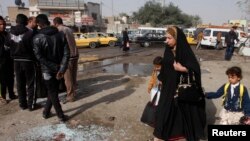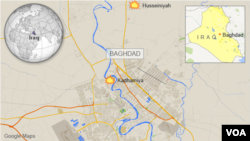A pair of bombings killed at least 15 people in and near Iraq's capital on Monday, police said, including a suicide blast in a mainly Shi'ite section of Baghdad.
The morning suicide attack in Baghdad's Kadhamiya neighborhood killed at least 13 people and wounded at least 42 others. The area is home to one of Shi'ite Islam's holiest shrines.
One witness, Salam Abid, said, "Today this morning at 7:30 (04:30 GMT) a suicide bomber, a young boy, set off an explosive-laden vest here in this busy square, crowded with rush-hour commuters and pupils.''
There was no immediate claim of responsibility for the attack, but such bombings are frequently attributed to Sunni militants targeting Shi'ites.
The second bomb exploded in the northern suburb of Husseiniyah, killing at least two people.
The deadly incidents follow a series of blasts Sunday that killed at least 37 people, hours after the end of a decade-old nighttime curfew.
Iraq has seen a dramatic surge in violence since 2013 when, according to United Nations' data, nearly 9,000 civilians and Iraqi security forces were killed. Last year was far worse, with about 15,500 deaths.
Iraq's Finance Minister Hoshyar Zebari told VOA's Kurdish service that Iraq appealed at a recent security summit in Germany for more international aid to help the country fight militants and continue reconstruction. He said a great deal of this year's budget has been designated to fight terrorists, including Islamic State militants.
"We appealed to the international community that Iraq is in need of funds for reconstruction for the liberated cities and towns and regions from ISIS in the near future. And we've done our share as Iraqis -- we've allocated half a billion U.S. dollars for this fund for Iraq -- but we need more support in order to be able to provide the basic needs and services to the population when they get back to their homes," he said.
Zebari said despite the financial difficulties Iraq is having, he is still optimistic about the future of the country.
"I believe this year will be challenging and difficult, but I think Iraq is not a bankrupt country. It has a lot of potential and resources," Zebari said. "We have a reserve at the Central Bank which is keeping our country steady. So I am not that pessimistic about the future of the country and this passing financial and economic crisis, which is not an Iraqi issue, but much wider."
Violence in Iraq continued to be high in January, with the U.N. reporting 1,570 deaths. Those figures include 585 members of the Iraqi army, who with the backing of training and airstrikes from a U.S.-led coalition are battling to stop the Islamic State group that seized large areas of Iraq and Syria last year.
The U.S. military command said Monday it launched four "precise and effective" raids in the last few days on Islamic State-held areas near Mosul.






